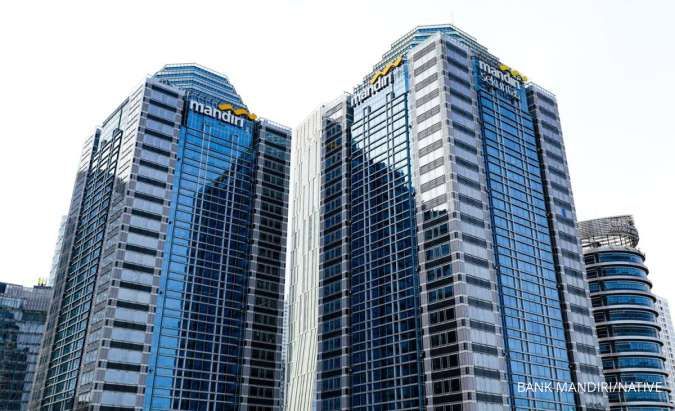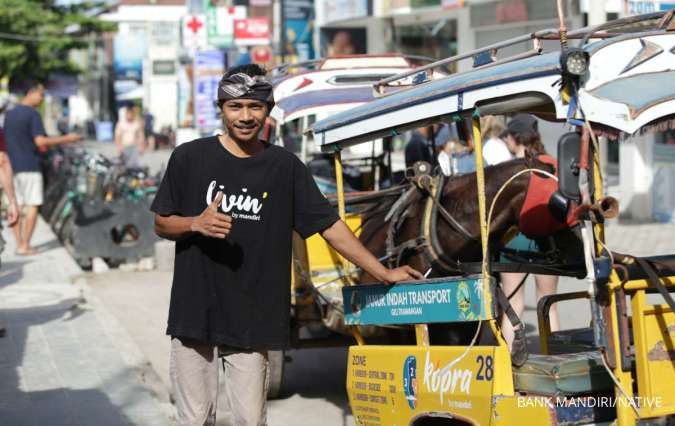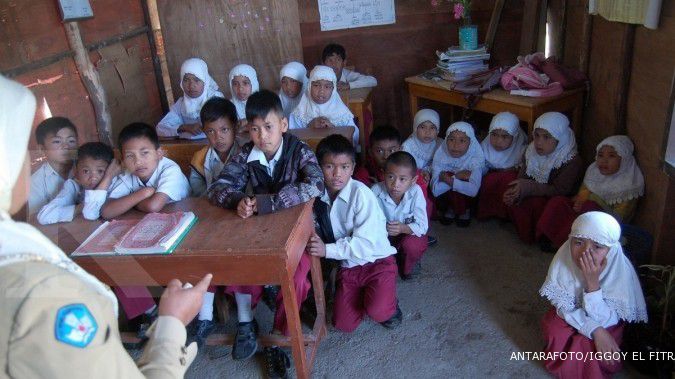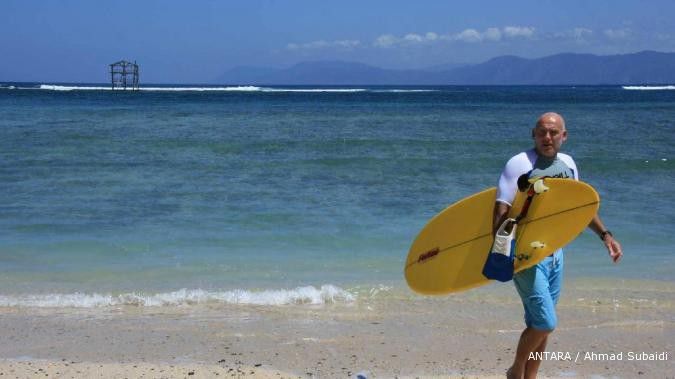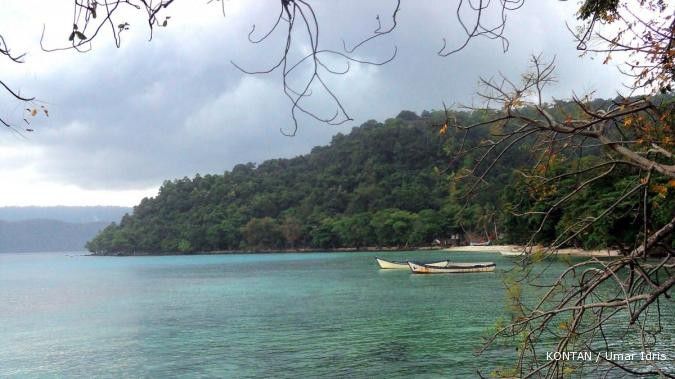JAKARTA. Indonesia, which is home to about 25 percent of fish species on the planet, is a diverse paradise. Various types of marine species such as fish, crustaceans, mollusks and marine plants of every size can be found in the country’s iridescent corals. Since the end of 2011, the Tourism and Creative Economy Ministry has been developing and promoting diving destinations that provide adventurous and pleasuring moments in the deep blue sea under its special interest tourism programs. “Marine tourism, particularly diving, is certainly a sector that we are trying to improve and promote as tourist destinations because the breathtaking beauty beneath our waters is a great attraction that will help us to bring in more tourists,” the ministry’s special interest tourism and meetings, incentives, convention, exhibition (MICE) promotional director Rizki Handayani told The Jakarta Post recently. “This sector becomes even more important because tourists with special interests are usually also big spenders. Most of divers are not going to dive in one or two spots, making them stay a week to one month in Indonesia,” she said. Under the program, Rizki said that the ministry had recently identified 4,000 diving spots across the archipelago. This year, they plan to set up a system that would help them record the number of special interest travelers, including divers visiting the area. However, as the government’s budget is limited, they picked only some of destinations in the promotional program when showcasing them in the upcoming DEMA Show, the only international trade event for the diving, action watersports and travel industries, in Orlando, the US, on Nov. 6 to 9. “We want more people to know about our marine riches so that more divers will visit them,” she said, adding that they are collaborating with national flag carrier Garuda Indonesia by providing all sports equipment free of charge in a bid to attract more special interest visitors. In Indonesia’s west, she said that the government is promoting Weh Island, Aceh, surrounded by the Andaman Sea. Weh has diverse marine natural wonders such as scorpion fish, barracudas, whale sharks and colorful nudibranchs with and numerous dive sites. She said that the island was ready to become a new diving paradise because infrastructure in Weh was improving. The annual Sail Sabang International Regatta, conducted since 2011, has encouraged the local government and investors to develop hotels, homestays, and creative industry products. Access to this western most point of the archipelago is also easy: Almost all domestic carriers such as Garuda, Lion Air and Sriwijaya Air are connecting Jakarta to Banda Aceh. From the capital of Aceh, travelers would only spend an hour to go to Weh Island by boat. In addition, in the central part of Indonesia, the ministry also plans to promote the Derawan Islands, in northeast part of East Kalimantan, as a new diving destination. Derawan Islands include Sangalaki, Kakaban and Maratua Islands, each has its own signature and unique attraction. Travelers can find green sea turtles, manta rays, white anemone plants, stingless jellyfish (Cassiopeia ornata), interesting underwater caves and cliffs. The islands also offer a variety of dives, such as wall diving, shipwreck explorations and beach dives. The location is accessible by flight from Jakarta, stopping over by Balikpapan en route to Tarakan. Garuda, Lion Air and Kalstar are providing services. Travelers can then take a speed boat for about four hours to reach Derawan. She said that this destination would become the next Bunaken or Wakatobi, which have gained international fame, as the government plans to conduct Sail Derawan 2014. New homestays and accommodations are currently being developed by locals and the private sector. In addition to that, the Transportation Ministry is working on an airport project in Maratua Island, in order to create easier access. Moreover, in the east, the government wants tourists to not only visit Komodo Island in East Nusa Tenggara, known for its prehistoric Komodo dragons, but also enjoy its stunning marine life. Komodo’s underwater habitat has over 1,000 species of fish, 260 species of corals and sponges. The ample natural riches have inspired the United Nations Educational, Scientific and Cultural Organization (UNESCO) to name the marine park a World Heritage Site. (Nurfika Osman, The Jakarta Post)
Govt promotes new diving paradise
JAKARTA. Indonesia, which is home to about 25 percent of fish species on the planet, is a diverse paradise. Various types of marine species such as fish, crustaceans, mollusks and marine plants of every size can be found in the country’s iridescent corals. Since the end of 2011, the Tourism and Creative Economy Ministry has been developing and promoting diving destinations that provide adventurous and pleasuring moments in the deep blue sea under its special interest tourism programs. “Marine tourism, particularly diving, is certainly a sector that we are trying to improve and promote as tourist destinations because the breathtaking beauty beneath our waters is a great attraction that will help us to bring in more tourists,” the ministry’s special interest tourism and meetings, incentives, convention, exhibition (MICE) promotional director Rizki Handayani told The Jakarta Post recently. “This sector becomes even more important because tourists with special interests are usually also big spenders. Most of divers are not going to dive in one or two spots, making them stay a week to one month in Indonesia,” she said. Under the program, Rizki said that the ministry had recently identified 4,000 diving spots across the archipelago. This year, they plan to set up a system that would help them record the number of special interest travelers, including divers visiting the area. However, as the government’s budget is limited, they picked only some of destinations in the promotional program when showcasing them in the upcoming DEMA Show, the only international trade event for the diving, action watersports and travel industries, in Orlando, the US, on Nov. 6 to 9. “We want more people to know about our marine riches so that more divers will visit them,” she said, adding that they are collaborating with national flag carrier Garuda Indonesia by providing all sports equipment free of charge in a bid to attract more special interest visitors. In Indonesia’s west, she said that the government is promoting Weh Island, Aceh, surrounded by the Andaman Sea. Weh has diverse marine natural wonders such as scorpion fish, barracudas, whale sharks and colorful nudibranchs with and numerous dive sites. She said that the island was ready to become a new diving paradise because infrastructure in Weh was improving. The annual Sail Sabang International Regatta, conducted since 2011, has encouraged the local government and investors to develop hotels, homestays, and creative industry products. Access to this western most point of the archipelago is also easy: Almost all domestic carriers such as Garuda, Lion Air and Sriwijaya Air are connecting Jakarta to Banda Aceh. From the capital of Aceh, travelers would only spend an hour to go to Weh Island by boat. In addition, in the central part of Indonesia, the ministry also plans to promote the Derawan Islands, in northeast part of East Kalimantan, as a new diving destination. Derawan Islands include Sangalaki, Kakaban and Maratua Islands, each has its own signature and unique attraction. Travelers can find green sea turtles, manta rays, white anemone plants, stingless jellyfish (Cassiopeia ornata), interesting underwater caves and cliffs. The islands also offer a variety of dives, such as wall diving, shipwreck explorations and beach dives. The location is accessible by flight from Jakarta, stopping over by Balikpapan en route to Tarakan. Garuda, Lion Air and Kalstar are providing services. Travelers can then take a speed boat for about four hours to reach Derawan. She said that this destination would become the next Bunaken or Wakatobi, which have gained international fame, as the government plans to conduct Sail Derawan 2014. New homestays and accommodations are currently being developed by locals and the private sector. In addition to that, the Transportation Ministry is working on an airport project in Maratua Island, in order to create easier access. Moreover, in the east, the government wants tourists to not only visit Komodo Island in East Nusa Tenggara, known for its prehistoric Komodo dragons, but also enjoy its stunning marine life. Komodo’s underwater habitat has over 1,000 species of fish, 260 species of corals and sponges. The ample natural riches have inspired the United Nations Educational, Scientific and Cultural Organization (UNESCO) to name the marine park a World Heritage Site. (Nurfika Osman, The Jakarta Post)
